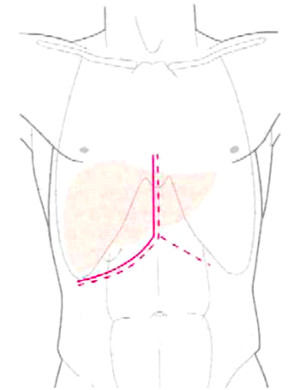Treatments
Ways of operating
The purpose of liver surgery is to remove that part of the liver where the tumor is located. In practice this means that often half or, if possible, part of the liver (a segment) is removed, so-called 'segment resection'.
It sometimes happens that the operation is started with a keyhole operation, in which a camera is used to see whether there is an extension of the disease on the peritoneum. If there are no suspicions of spreading disease, the operation is continued.
During surgery, the anatomical division of the liver into different segments is taken into account. Each segment has its own blood supply. This subdivision into segments is used in determining whether surgery is a treatment option. It is very important to know whether enough liver tissue remains when part of a liver is removed.
The medical specialist will discuss with you at the outpatient clinic which part of your liver needs to be removed. Regardless of which part(s) of the liver is/are removed, in most cases the scar will look like Figure 2.
The duration of the operation depends on the extent of the procedure, but will usually be between 3 to 8 hours. If an extensive operation has been performed, you will stay in the Intensive Care Unit after the operation to be able to monitor you as well as possible.

After the operation
In most cases you will be in the Intensive Care Unit or High Care Unit for approximately 24 hours after your liver surgery. Because the IC bed must be available to you, it is occasionally possible that an operation has to be postponed due to a shortage of IC beds. Your attending physicians will do their best to prevent this from happening. However, unexpected things can sometimes happen the night before a person's surgery, such as a traffic accident or liver transplant, as a result of which the beds in the Intensive Care Unit are unplanned. This is a force majeure situation.
What risks or complications are there with liver surgery?
There are risks associated with every surgery. There is always a chance that a complication will occur. The most common complications are (wound) infections, bile leakage, delayed healing due to the underlying liver disease or failure of liver function.
The surgeons of the Erasmus MC Liver Center perform more than 200 liver operations every year, which means they have a lot of experience.
Alternatives to liver surgery and/or transplant
Sometimes liver surgery or liver transplantation is not possible or necessary. There are many new techniques available in the Erasmus MC Liver Center to keep a liver tumor under control. Below you can read information about these alternatives to liver surgery.